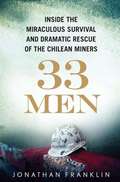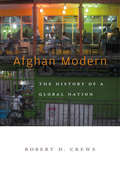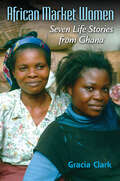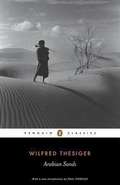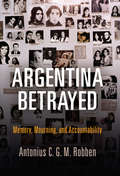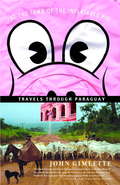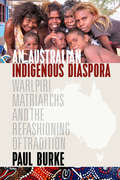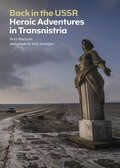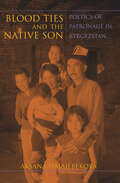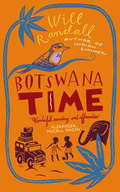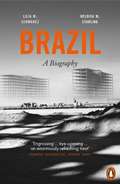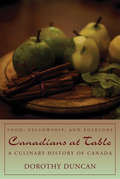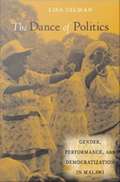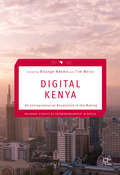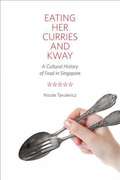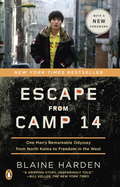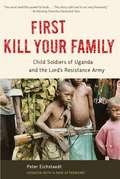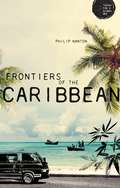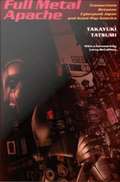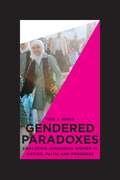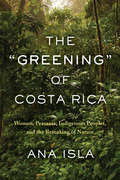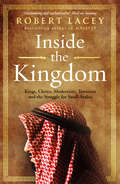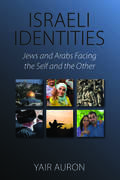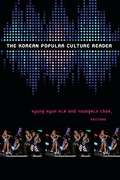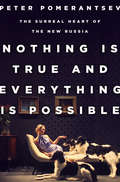Special Collections
World Book Day 2020: Marrakesh Treaty
- Table View
- List View
33 Men
by Jonathan FranklinHaving had unparalleled access to the Chilean mine disaster, award-winning journalist Jonathan Franklin takes readers to the heart of a remarkable story of human endurance, survival, and historic heroism.
33 Men is the groundbreaking, authoritative account of the Chilean mine disaster, one of the longest human entrapments in history. Rushing to the scene when the miners were discovered, Franklin obtained a coveted "Rescue Team" pass and reported directly from the front lines of the rescue operation, beyond police controls, for six weeks. Based on more than 110 intimate interviews with the miners, their families, and the rescue team, Franklin's narrative captures the remarkable story of these men and women, in details shocking, beautiful, comedic, and heroic.
Gripping and raw with never-before-revealed details, 33 Men is a true story that reads like a thriller.
Afghan Modern
by Robert D. CrewsRugged, remote, riven by tribal rivalries and religious violence, Afghanistan seems to many a country frozen in time and forsaken by the world. Afghan Modern presents a bold challenge to these misperceptions, revealing how Afghans, over the course of their history, have engaged and connected with a wider world and come to share in our modern globalized age.
Always a mobile people, Afghan travelers, traders, pilgrims, scholars, and artists have ventured abroad for centuries, their cosmopolitan sensibilities providing a compass for navigating a constantly changing world. Robert Crews traces the roots of Afghan globalism to the early modern period, when, as the subjects of sprawling empires, the residents of Kabul, Kandahar, and other urban centers forged linkages with far-flung imperial centers throughout the Middle East and Asia. Focusing on the emergence of an Afghan state out of this imperial milieu, he shows how Afghan nation-making was part of a series of global processes, refuting the usual portrayal of Afghans as pawns in the “Great Game” of European powers and of Afghanistan as a “hermit kingdom.”
In the twentieth century, the pace of Afghan interaction with the rest of the world dramatically increased, and many Afghan men and women came to see themselves at the center of ideological struggles that spanned the globe. Through revolution, war, and foreign occupations, Afghanistan became even more enmeshed in the global circulation of modern politics, occupying a pivotal position in the Cold War and the tumultuous decades that followed.
African Market Women
by Gracia C. Clark“A wonderfully evocative compilation of seven life histories from Kumasi, Ghana, of women Gracia Clark encountered in the course of a lifetime of fieldwork.” —African Studies ReviewIn these lively life stories, women market traders from Ghana comment on changing social and economic times and on reasons for their prosperity or decline in fortunes. Gracia Clark shows that market women are intimately connected with economic policy on a global scale. Many work at the intersection of sophisticated networks of transnational commerce and migration. They have dramatic memories of independence and the growth of their new nation, including political rivalries, price controls, and violent raids on the market. The experiences of these women give substance to their reflections on globalization, capital accumulation, colonialism, technological change, environmental degradation, teenage pregnancy, marriage, children, changing gender roles, and spirituality. Clark’s commentary illuminates the complex historical and cultural setting of these deeply revealing lives.“Shows, in direct speech, how family, kinship, marriage and age/generation work together in a daily life which is shaped by political, demographic, cultural, and wholly accidental change in people’s circumstances.” —Jane Guyer, Johns Hopkins University“Overall, this is an excellent book: it will be useful in undergraduate teaching and makes an important contribution to our understanding of the richness and variety of women’s lives in West Africa.” —Journal of Africa“Clark . . . offers intriguing insights into the lives of seven Akan women traders . . . Recommended.” —Choice
Arabian Sands
by Rory Stewart and Wilfred ThesigerIn Arabian Sands, William Thesiger charts the time he spent living with the Bedu, including his legendary traverses of the Empty Quarter.
Argentina Betrayed
by Antonius C. RobbenThe ruthless military dictatorship that ruled Argentina between 1976 and 1983 betrayed the country's people, presiding over massive disappearances of its citizenry and, in the process, destroying the state's trustworthiness as the guardian of safety and well-being. Desperate relatives risked their lives to find the disappeared, and one group of mothers defied the repressive regime with weekly protests at the Plaza de Mayo in Buenos Aires. How do societies cope with human losses and sociocultural traumas in the aftermath of such instances of political violence and state terror?
In Argentina Betrayed, Antonius C. G. M. Robben demonstrates that the dynamics of trust and betrayal that convulsed Argentina during the dictatorship did not end when democracy returned but rather persisted in confrontations over issues such as the truth about the disappearances, the commemoration of the past, and the guilt and accountability of perpetrators. Successive governments failed to resolve these debates because of erratic policies made under pressure from both military and human rights groups. Mutual mistrust between the state, retired officers, former insurgents, and bereaved relatives has been fueled by recurrent revelations and controversies that prevent Argentine society from conclusively coming to terms with its traumatic past.
With thirty years of scholarly engagement with Argentina—and drawing on his extensive, fair-minded interviews with principals at all points along the political spectrum—Robben explores how these ongoing dynamics have influenced the complicated mourning over violent deaths and disappearances. His analysis deploys key concepts from the contemporary literature of human rights, transitional justice, peace and reconciliation, and memory studies, including notions of trauma, denial, accountability, and mourning. The resulting volume is an indispensable contribution to a better understanding of the terrible crimes committed by the Argentine dictatorship in the 1970s and their aftermath.
At the Tomb of the Inflatable Pig
by John GimletteA wildly humorous account of the author's travels across Paraguay-South America's darkly fabled, little-known "island surrounded by land."
Rarely visited by tourists and barely touched by global village sprawl, Paraguay remains a mystery to outsiders. Think of this small nation and your mind is likely to jump to Nazis, dictators, and soccer. Now, John Gimlette's eye-opening book-equal parts travelogue, history, and unorthodox travel guide-breaches the boundaries of this isolated land," and illuminates a little-understood place and its people.
It is a wonderfully animated telling of Paraguay's story: of cannibals, Jesuits, and sixteenth-century Anabaptists; of Victorian Australian socialists and talented smugglers; of dictators and their mad mistresses; bloody wars and Utopian settlements; and of lives transplanted from Japan, Britain, Poland, Russia, Germany, Ireland, Korea, and the United States.
The author travels from the insular cities and towns of the east, along ghostly trails through the countryside, to reach the Gran Chaco of the west: the "green hell" covering almost two-thirds of the country, where 4 percent of the population coexists-more or very-much-less peacefully-with a vast array of exotic wildlife that includes jaguars, prehistoric lungfish, and their more recently evolved distant cousins, the great fighting river fish. Gimlette visits with Mennonites and the indigenas, arms dealers and real-estate tycoons, shopkeepers, government bureaucrats and, of course, Nazis.
Filled with bizarre incident, fascinating anecdote, and richly evocative detail, At the Tomb of the Inflatable Pig is a brilliant description of a country of eccentricity and contradiction, of beguilingly individualistic men and women, and of unexpected and extraordinary beauty. It is a vivid, often riotous, always fascinating, journey.
An Australian Indigenous Diaspora
by Paul BurkeSome indigenous people, while remaining attached to their traditional homelands, leave them to make a new life for themselves in white towns and cities, thus constituting an “indigenous diaspora”.
This innovative book is the first ethnographic account of one such indigenous diaspora, the Warlpiri, whose traditional hunter-gatherer life has been transformed through their dispossession and involvement with ranchers, missionaries, and successive government projects of recognition.
By following several Warlpiri matriarchs into their new locations, far from their home settlements, this book explores how they sustained their independent lives, and examines their changing relationship with the traditional culture they represent.
Back in the USSR
by Nick Danziger and Rory MacleanIan Fleming could not have imagined a better place to set a thriller: an upstart mini-state on the edge of Europe, Transnistria is a nowhereland, a Soviet museum occupied by Russian peace-keepers near the Black Sea.
Its oligarchs in Adidas tracksuits hunt wild boar with AK-47s. Its young people train for revolution at the Che Guevara High School of Political Leadership. Its secret factories have supplied arms to Chechnya and electrical cable to Iran's Bushehr nuclear power plant. Its isolation and tiny size belie the real threat it poses to the West. To many observers, Transnistria is the North Korea of Europe.
Yet its new president has launched a cunning coup of political marketing, appointing as his top ministers personable young women like the Facebook-savvy Cheryl Cole lookalike Foreign Minister, sexing-up the republic's image abroad, and using their glitter to obscure this internationally unrecognised non-state's shadowy past. Now Western ambassadors and foreign ministers are queuing up to meet them.
Rory MacLean and Nick Danziger, two of Europe's most intrepid travellers and chroniclers, document life in the only country in the world not to have recognised the collapse of the Soviet Union. Readers will find themselves truly back in the USSR… with a difference.
Blood Ties and the Native Son
by Aksana IsmailbekovaAn anthropologist explores the politics and society of Kyrgyzstan through a study of one influential man’s life.A pioneering study of kinship, patronage, and politics in Central Asia, Blood Ties and the Native Son tells the story of the rise and fall of a man called Rahim, an influential and powerful patron in rural northern Kyrgyzstan, and of how his relations with clients and kin shaped the economic and social life of the region. Many observers of politics in post-Soviet Central Asia have assumed that corruption, nepotism, and patron-client relations would forestall democratization. Looking at the intersection of kinship ties with political patronage, Aksana Ismailbekova finds instead that this intertwining has in fact enabled democratization—both kinship and patronage develop apace with democracy, although patronage relations may stymie individual political opinion and action.“This book is an important contribution to a growing literature on Central Asian politics and society, and by complicating dominant narratives about the dangers of weak state institutions, Ismailbekova has much to offer to the broader research project on democratization and clientelism.” —Europe-Asia Studies
Botswana Time
by Will RandallWill Randall travels with a purpose, as well as an outrageous sense of fortune. In INDIAN SUMMER he found himself, by chance, having the extraordinary experience of helping slum schoolchildren put on a play to help save their school. In Botswana he was taken up by a headmaster to teach a class of six year olds at The River of Life school. They are football crazy and one of Will's jobs is to take them to play neighbouring (sometimes as much as 100 miles away) schools. Camping en-route or staying in farms and rural villages, often travelling by foot or dug-out punts, thousands of antelope, elephant, buffalo and zebra follow their progress. The sound of lions, leopards and hyenas become the soundtrack of their dreams. Against all the odds they find themselves preparing for the Grand Final of the season - the titanic clash with arch rivals, Victoria Falls Primary school.Both an endearing personal story and a travel book about a little-known but highly successful country, BOTSWANA TIME will win new fans for both Will Randall and the extraordinary country of Botswana.
Brazil
by Heloisa Maria Starling and Lilia Moritz SchwarczSince Europeans first reached Brazil in 1500 it has been an unfailing source of extraordinary fascination. More than any other part of the 'New World' it displayed both the greatest beauty and grandeur and witnessed scenes of the most terrible European ferocity.
Brazil: A Biography, written by two of Brazil's leading historians and a bestseller in Brazil itself, is a remarkable attempt to convey the overwhelming diversity and challenges of this huge country from its origins to the 21st century - larger than the contiguous USA and still in some regions not fully mapped. The book's major themes are the near-continuous battles to create both political institutions and social frameworks that would allow stable growth, legal norms and protection for all its citizens.
Brazil's failure to achieve these except in the very short term has been tragic, but even now it remains one of the world's great experiments - creative, harsh, unique and as compelling a story for its inhabitants as for outsiders.
Canadians at Table
by Dorothy DuncanHere is one of the most unique and fascinating food histories in the world, exploring the diverse culinary history of Canada. Winner of the 2007 Canadian Culinary Book Award for Canadian Food Culture
In Canadians at Table we learn about lessons of survival from the First Nations, the foods that fueled fur traders, and the adaptability of early settlers to their new environment. As communities developed and transportation improved, waves of newcomers arrived, bringing memories of foods, beverages, and traditions they had known, which were almost impossible to implement in their new homeland. They discovered instead how to use native plants for many of their needs. Community events and institutions developed to serve religious, social, and economic needs from agricultural and temperance societies to Womens Institutes, from markets and fairs to community meals and celebrations.
The Dance of Politics
by Lisa GilmanElection campaigns, political events, and national celebration days in Malawi usually feature groups of women who dance and perform songs of praise for politicians and political parties. These lively performances help to attract and energize throngs of prospective voters.
However, as Lisa Gilman explains, “praise performing” is one of the only ways that women are allowed to participate in a male-dominated political system. Although political performances by women are not unique to Malawi, the case in Malawi is complicated by the fact that until 1994 allMalawianwomen were required to perform on behalf of the long-reigning political party and its self-declared “President for Life,” Dr. Hastings Kamuzu Banda+.
This is the first book to examine the present-day situation, where issues of gender, economics and politics collide in surprising ways. Along with its solid grounding in the relevant literature, The Dance of Politics draws strength from Gilman’s first-hand observations and her interviews with a range of participants in the political process, from dancers to politicians.
Digital Kenya
by Bitange Ndemo and Tim WeissPresenting rigorous and original research, this volume offers key insights into the historical, cultural, social, economic and political forces at play in the creation of world-class ICT innovations in Kenya. Following the arrival of fiber-optic cables in 2009, Digital Kenya examines why the initial entrepreneurial spirit and digital revolution has begun to falter despite support from motivated entrepreneurs, international investors, policy experts and others.
Written by engaged scholars and professionals in the field, the book offers 15 eye-opening chapters and 14 one-on-one conversations with entrepreneurs and investors to ask why establishing ICT start-ups on a continental and global scale remains a challenge on the "Silicon Savannah". The authors present evidence-based recommendations to help Kenya to continue producing globally impactful ICT innovations that improve the lives of those still waiting on the side-lines, and to inspire other nations to do the same. This book is open access under a CC BY license.
Eating Her Curries and Kway
by Nicole TaruleviczWhile eating is a universal experience, for Singaporeans it carries strong national connotations. The popular Singaporean-English phrase "Die die must try" is not so much hyperbole as it is a reflection of the lengths that Singaporeans will go to find great dishes.
In Eating Her Curries and Kway: A Cultural History of Food in Singapore, Nicole Tarulevicz argues that in a society that has undergone substantial change in a relatively short amount of time, food serves Singaporeans as a poignant connection to the past. Covering the period from British settlement in 1819 to the present and focusing on the post-1965 postcolonial era, Tarulevicz tells the story of Singapore through the production and consumption of food.
Analyzing a variety of sources that range from cookbooks to architectural and city plans, Tarulevicz offers a thematic history of this unusual country, which was colonized by the British and operated as a port within Malaya, but which is without a substantial pre-colonial history.
Connecting food culture to the larger history of Singapore, she discusses various topics including domesticity and home economics, housing and architecture, advertising, and the regulation of food-related manners and public behavior such as hawking, littering, and chewing gum.
Moving away from the predominantly political and economic focus of other histories of Singapore, Tarulevicz provides an important alternative reading of Singaporean society.
Escape from Camp 14
by Blaine HardenA New York Times bestseller, the shocking story of one of the few people born in a North Korean political prison to have escaped and survived.
North Korea is isolated and hungry, bankrupt and belligerent. It is also armed with nuclear weapons. Between 150,000 and 200,000 people are being held in its political prison camps, which have existed twice as long as Stalin's Soviet gulags and twelve times as long as the Nazi concentration camps. Very few born and raised in these camps have escaped. But Shin Donghyuk did.
In Escape from Camp 14, acclaimed journalist Blaine Harden tells the story of Shin Dong-hyuk and through the lens of Shin's life unlocks the secrets of the world's most repressive totalitarian state. Shin knew nothing of civilized existence-he saw his mother as a competitor for food, guards raised him to be a snitch, and he witnessed the execution of his own family.
Through Harden's harrowing narrative of Shin's life and remarkable escape, he offers an unequaled inside account of one of the world's darkest nations and a riveting tale of endurance, courage, and survival.
First Kill Your Family
by Peter EichstaedtTold through the voices of those who have suffered, this illuminating exposé examines how a forgotten region of one of Africa's most promising nations--Uganda, dubbed "the pearl of Africa" by Winston Churchill--has been systematically destroyed by a bloody, senseless, and seemingly endless war that has gone largely unnoticed by the rest of the world.
For the past 20 years, the Lord's Resistance Army has ravaged northern Uganda and has been led by the reclusive Joseph Kony, a former witch doctor and self-professed spirit medium. Through the large-scale abduction and manipulation of children, Kony transformed his army into an efficient killing machine that has murdered nearly 100,000 and displaced two million people.
Kony utilized the society's pervasive belief in witchcraft to instill cultlike convictions in his fighters.
This insightful analysis delves into the war's foundations and argues that, much like Rwanda's genocide, international intervention is needed to stop Uganda's virulent cycle of violence.
This updated paperback edition includes a new afterword by the author that discusses developments since 2008, including failed attempts to capture Joseph Kony and the controversial Kony 2012 video.
Frontiers of the Caribbean
by Philip NantonThis book argues that the Caribbean frontier, usually assumed to have been eclipsed after colonial conquest, remains a powerful but unrecognised element of Caribbean island culture. Combining analytical and creative genres of writing, it explores historical and contemporary patterns of frontier change through a case study of the little-known Eastern Caribbean multi-island state of St Vincent and the Grenadines. Modern frontier traits are located in the wandering woodcutter, the squatter on government land and the mountainside ganja grower. But the frontier is also identified as part of global production that has shaped island tourism, the financial sector and patterns of migration.An electronic edition of this book is freely available under a Creative Commons (CC BY-NC-ND) licence.
Full Metal Apache
by Takayuki TatsumiTakayuki Tatsumi is one of Japan's leading cultural critics, renowned for his work on American literature and culture. With his encyclopedic knowledge and fan's love of both Japanese and American art and literature, he is perhaps uniquely well situated to offer this study of the dynamic crosscurrents between the avant-gardes and pop cultures of Japan and the United States.
In Full Metal Apache, Tatsumi looks at the work of artists from both sides of the Pacific: fiction writers and poets, folklorists and filmmakers, anime artists, playwrights, musicians, manga creators, and performance artists. Tatsumi shows how, over the past twenty years or so, writers and artists have openly and exuberantly appropriated materials drawn from East and West, from sources both high and low, challenging and unraveling the stereotypical images Japan and America have of one another.
Full Metal Apache introduces English-language readers to a vast array of Japanese writers and performers and considers their work in relation to the output of William Gibson, Thomas Pynchon, H. G. Wells, Jack London, J. G. Ballard, and other Westerners. Tatsumi moves from the poetics of metafiction to the complex career of Madame Butterfly stories and from the role of the Anglo-American Lafcadio Hearn in promoting Japanese folklore within Japan during the nineteenth century to the Japanese monster Godzilla as an embodiment of both Japanese and Western ideas about the Other.
Along the way, Tatsumi develops original arguments about the self-fashioning of "Japanoids" in the globalist age, the philosophy of "creative masochism" inherent within postwar Japanese culture, and the psychology of "Mikadophilia" indispensable for the construction of a cyborg identity. Tatsumi's exploration of the interplay between Japanese and American cultural productions is as electric, ebullient, and provocative as the texts and performances he analyzes.
Gendered Paradoxes
by Fida J. AdelyIn 2005 the World Bank released a gender assessment of the nation of Jordan, a country that, like many in the Middle East, has undergone dramatic social and gender transformations, in part by encouraging equal access to education for men and women. The resulting demographic picture there--highly educated women who still largely stay at home as mothers and caregivers-- prompted the World Bank to label Jordan a "gender paradox. " In Gendered Paradoxes, Fida J. Adely shows that assessment to be a fallacy, taking readers into the rarely seen halls of a Jordanian public school--the al-Khatwa High School for Girls--and revealing the dynamic lives of its students, for whom such trends are far from paradoxical.
Through the lives of these students, Adely explores the critical issues young people in Jordan grapple with today: nationalism and national identity, faith and the requisites of pious living, appropriate and respectable gender roles, and progress. In the process she shows the important place of education in Jordan, one less tied to the economic ends of labor and employment that are so emphasized by the rest of the developed world. In showcasing alternative values and the highly capable young women who hold them, Adely raises fundamental questions about what constitutes development, progress, and empowerment--not just for Jordanians, but for the whole world.
The "Greening" of Costa Rica
by Ana IslaSince the 1992 Earth Summit in Rio de Janeiro, the concept of sustainable development has become the basis for a vast number of "green industries" from eco-tourism to carbon sequestration.
In The "Greening" of Costa Rica, Ana Isla exposes the results of the economist's rejection of physical limits to growth, the biologist's fetish with such limits, and the indebtedness of peripheral countries.
Isla's case study is the 250,000 hectare Arenal-Tilaran Conservation Area, created in the late 1990s as the result of Canada-Costa Rica debt-for-nature swaps.
Rather than reducing poverty and creating equality, development in and around the conservation area has dispossessed and disenfranchised subsistence farmers, expropriating their land, water, knowledge, and labour.
Drawing on a decade of fieldwork in these communities, Isla exposes the duplicity of a neoliberal model in which the environment is converted into commercial assets such as carbon credits, intellectual property, cash crops, open-pit mining, and eco-tourism, few of whose benefits flow to the local population.
Inside the Kingdom
by Robert LaceySaudi Arabia is a country defined by paradox: it sits atop some of the richest oil deposits in the world, and yet the country's roiling disaffection produced sixteen of the nineteen 9/11 hijackers. It is a modern state, driven by contemporary technology, and yet its powerful religious establishment would have its customs and practices rolled back to match those of the Prophet Muhammed over a thousand years ago.
In a world where events in the Middle East continue to have geopolitical consequences far beyond the region's boundaries, an understanding of this complex nation is essential.
With Inside the Kingdom, British journalist and bestselling author Robert Lacey has given us one of the most penetrating and insightful looks at Saudi Arabia ever produced. More than twenty years after he first moved to the country to write about the Saudis at the end of the oil boom, Lacey has returned to find out how the consequences of the boom produced a society at war with itself. Filled with stories told by a broad range of Saudis, from high princes and ambassadors to men and women on the street, Inside the Kingdom is in many ways the story of the Saudis in their own words.
Israeli Identities
by Yair AuronThe question of identity is one of present-day Israel's cardinal and most pressing issues. In a comprehensive examination of the identity issue, this study focuses on attitudes toward the Jewish people in Israel and the Diaspora; the Holocaust and its repercussions on identity; attitudes toward the state of Israel and Zionism; and attitudes toward Jewish religion.
Israeli Arab students (Israeli Palestinians) and Jewish Israeli students were asked corresponding questions regarding their identity. It was found that, rather than lessening its impact over the years, the Holocaust has become a major factor, at times the paramount factor in Jewish identity. Similarly, among Palestinians the Naqba has become a major factor in Palestinian-Israeli identity.
However, the overall results show that the identity of a Jewish citizen of Israel is not purely Israeli, nor is it purely Jewish. It is, to varying degrees, a synthesis of Jewish and Israeli components, depending on the particular sub-groups or sub-identities. The same holds for Israeli-Arabs or Israeli-Palestinians who have neither a purely Israeli identity nor a purely Palestinian (or Arab) one.
The Korean Popular Culture Reader
by Kyung Hyun Kim and Youngmin ChoeOver the past decade, Korean popular culture has become a global phenomenon. The "Korean Wave" of music, film, television, sports, and cuisine generates significant revenues and cultural pride in South Korea. The Korean Popular Culture Reader provides a timely and essential foundation for the study of "K-pop," relating the contemporary cultural landscape to its historical roots. The essays in this collection reveal the intimate connections of Korean popular culture, or hallyu, to the peninsula's colonial and postcolonial histories, to the nationalist projects of the military dictatorship, and to the neoliberalism of twenty-first-century South Korea. Combining translations of seminal essays by Korean scholars on topics ranging from sports to colonial-era serial fiction with new work by scholars based in fields including literary studies, film and media studies, ethnomusicology, and art history, this collection expertly navigates the social and political dynamics that have shaped Korean cultural production over the past century.Contributors. Jung-hwan Cheon, Michelle Cho, Youngmin Choe, Steven Chung, Katarzyna J. Cwiertka, Stephen Epstein, Olga Fedorenko, Kelly Y. Jeong, Rachael Miyung Joo, Inkyu Kang, Kyu Hyun Kim, Kyung Hyun Kim, Pil Ho Kim, Boduerae Kwon, Regina Yung Lee, Sohl Lee, Jessica Likens, Roald Maliangkay, Youngju Ryu, Hyunjoon Shin, Min-Jung Son, James Turnbull, Travis Workman
Nothing Is True and Everything Is Possible
by Peter PomerantsevIn the new Russia, even dictatorship is a reality show.
Professional killers with the souls of artists, would-be theater directors turned Kremlin puppet-masters, suicidal supermodels, Hell’s Angels who hallucinate themselves as holy warriors, and oligarch revolutionaries: welcome to the glittering, surreal heart of twenty-first-century Russia. It is a world erupting with new money and new power, changing so fast it breaks all sense of reality, home to a form of dictatorship-far subtler than twentieth-century strains-that is rapidly rising to challenge the West.
When British producer Peter Pomerantsev plunges into the booming Russian TV industry, he gains access to every nook and corrupt cranny of the country. He is brought to smoky rooms for meetings with propaganda gurus running the nerve-center of the Russian media machine, and visits Siberian mafia-towns and the salons of the international super-rich in London and the US.
As the Putin regime becomes more aggressive, Pomerantsev finds himself drawn further into the system. Dazzling yet piercingly insightful, Nothing Is True and Everything Is Possible is an unforgettable voyage into a country spinning from decadence into madness.
